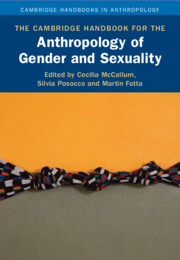Book contents
- The Cambridge Handbook for the Anthropology of Gender and Sexuality
- Cambridge Handbooks in Anthropology
- The Cambridge Handbook for the Anthropology of Gender and Sexuality
- Copyright page
- Contents
- Contributors
- 1 Introduction to The Cambridge Handbook for the Anthropology of Gender and Sexuality
- Part One Openings and Orientations
- Part Two Knowledges and Domains
- 6 Gender, Sociality, and the Person
- 7 The Postmodern Moment in Gender Studies and Anthropology
- 8 Gender(ed) Language and the Linguistics of Sexuality
- 9 Conceptualizing Bodies, Hierarchy, and Gendering across Cultures
- 10 Language, Gender and Sexuality, and Performativity
- 11 Anthropological Engagements with Men and Masculinities
- Part Three Resistances and Intersections
- Part Four Desires and Relations
- Part Five Recursivities and Futures
- Name Index
- Subject Index
- References
7 - The Postmodern Moment in Gender Studies and Anthropology
from Part Two - Knowledges and Domains
Published online by Cambridge University Press: 29 September 2023
- The Cambridge Handbook for the Anthropology of Gender and Sexuality
- Cambridge Handbooks in Anthropology
- The Cambridge Handbook for the Anthropology of Gender and Sexuality
- Copyright page
- Contents
- Contributors
- 1 Introduction to The Cambridge Handbook for the Anthropology of Gender and Sexuality
- Part One Openings and Orientations
- Part Two Knowledges and Domains
- 6 Gender, Sociality, and the Person
- 7 The Postmodern Moment in Gender Studies and Anthropology
- 8 Gender(ed) Language and the Linguistics of Sexuality
- 9 Conceptualizing Bodies, Hierarchy, and Gendering across Cultures
- 10 Language, Gender and Sexuality, and Performativity
- 11 Anthropological Engagements with Men and Masculinities
- Part Three Resistances and Intersections
- Part Four Desires and Relations
- Part Five Recursivities and Futures
- Name Index
- Subject Index
- References
Summary
The postmodern moment was both important and turbulent in both anthropology and gender studies. This chapter focuses on how postmodern thought, which is described as being ant-foundational, engaged with thinking about gender and sexuality in gender studies and in anthropology, both in conjunction with each other as disciplines and in conjunction with feminist (and gay and lesbian) movements, which were influential during the same period. As an intellectual trend, the postmodern moment never attracted sufficient advocates to become a majority approach, and its time in the limelight was quickly over; nevertheless, the authors argue that the moment had lasting effects, particularly in terms of thinking about gender and sexuality. More specifically, they suggest that the introduction of postmodern thought affected the politicization of thought about gender and sexuality in the academy. In gender studies, it coincided with the founding of the discipline; in anthropology, it initially most notably came through the route of feminist-inspired kinship studies, and later through the influence of queer on studies of sexuality and embodiment.
Keywords
- Type
- Chapter
- Information
- Publisher: Cambridge University PressPrint publication year: 2023



